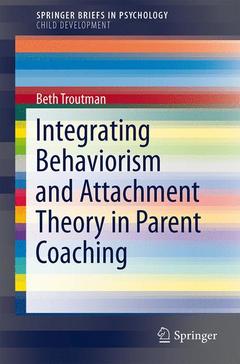Description
Integrating Behaviorism and Attachment Theory in Parent Coaching, 2015
SpringerBriefs in Child Development Series
Author: Troutman Beth
Language: English
Subjects for Integrating Behaviorism and Attachment Theory in Parent...:
Keywords
Attachment theory; Attachment theory and behaviorism; Attachment-informed parent coaching; Early childhood behavior; Early childhood interventions; Early childhood mental health; Evidence-based parenting interventions; Evidence-based psychotherapy; Infant attachment; Infant behavior and development; Infant mental health; PCIT; Parent education; Parent management training; Parent-Child Interaction Therapy; Parent-child interventions; Parenting interventions; Social learning theory; Video feedback
126 p. · 15.5x23.5 cm · Paperback
Description
/li>Contents
/li>Biography
/li>Comment
/li>
This practical guide provides a robust positive-parenting framework for professionals coaching parents of infants, toddlers, and primary school children. The first half of the book explains behaviorist and attachment theories of parenting, comparing, contrasting, and synthesizing them into an effective, research-informed approach to practice. The second half shows these guidelines in action, using play therapy as a means to improve disruptive child behaviors, correct harsh parenting practices, and address root causes of adversarial parent-child relationships. Throughout these chapters, vivid composite cases demonstrate not only common parent-child impasses but also therapist empathy, flexibility, and self-awareness.
This innovative text:
- Makes a rigorous case for a combined behavioral/attachment approach to parent coaching.
- Reviews current data on behavioral and attachment-based parenting interventions.
- Details the use of an attachment-informed approach to providing behavioral interventions such as Parent-Child Interaction Therapy and Helping the Noncompliant Child.
- Illustrates how parent coaching can be tailored to match different patterns of attachment.
- Includes tools for evaluating coaching sessions.
Integrating Behaviorism and Attachment Theory in Parent Coaching is an essential guide for professionals, graduate students, and researchers in clinical, child and school psychology, social work, pediatrics, mental health counseling, and nursing.
Part I: Two Models for Viewing Parent-Child Interactions: Behaviorism and Attachment Theory.- Chapter 1. Viewing Parent-Child Interactions Through the Lens of Behaviorism.- Chapter 2. Viewing Parent-Child Interactions Through the Lens of Attachment Theory.- Chapter 3. Comparison of Attachment and Behavioral Parenting Perspectives.- Part II: Integrated Model for Coaching Positive Parenting.- Chapter 4. Framework for Integrating Behaviorism and Attachment Theory in Parent Coaching.- Chapter 5. Ordinary Magic.- Chapter 6. Can’t Live With Her, Can’t Live Without Her.- Chapter 7. What Does Not Kill Me Makes Me Stronger.- Chapter 8. Like a Refugee.
Describes similarities and differences between parent-child interventions based on attachment theory and behaviorism
Discusses specific strategies for infants and young children adopted following maltreatment, attachment disruptions, and deprivation
Summarizes theoretical foundations and research on coaching parents in their interactions with infants and young children
Explains in-the-moment coaching and video feedback as strategies for addressing parenting concerns and child problems?
Includes supplementary material: sn.pub/extras
These books may interest you

Attachment Centered Play Therapy 64.75 €



